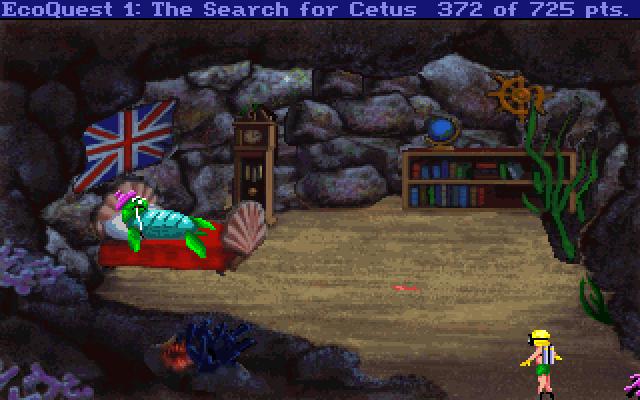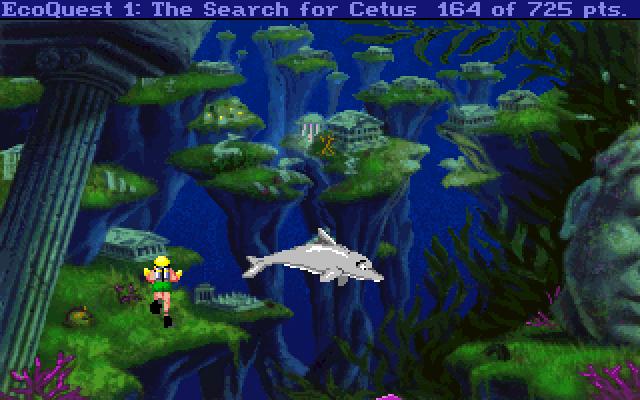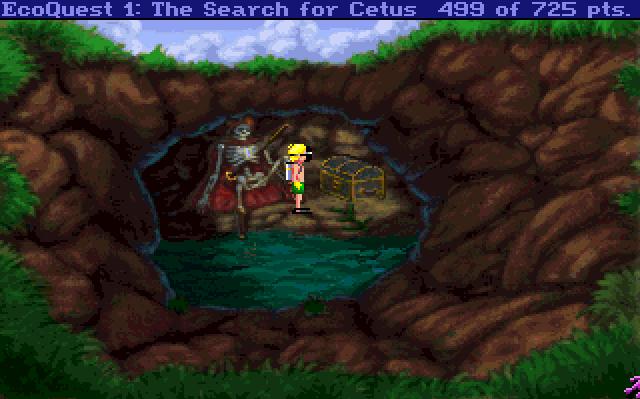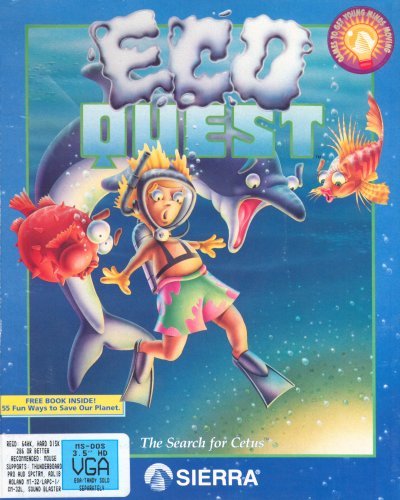Since a part of my time this year was dedicated to revisiting some of the Lucasarts classics, and complaining at length about the way Sierra hecked everything up in their development of the point-and-click genre, I thought it was important to take a moment to draw attention to a time that Sierra made a better Lucasarts games than Lucasarts made… within some constraints.
Let’s talk about some 1990s Environmentalist Kids’ Culture, in the story of Eco Quest.
The Game As They Is Played
In Eco Quest, you take on the role of Adam, a painfully earnest and sweet little kid, son of an oceanographer and environmentalist, as he starts a long, boring summer having just moved to a new place. Adam’s an insular kid, who prefers the company of the animals his dad researches, because he feels awkward and weird, and then he learns that the dolphin he befriends can talk –
And thus begins an amazing adventure under the sea.
There’s lots to unpack in the story of Adam and his dolphin buddy Delphinus. There’s the way the story puts importance on healing and surviving, on fixing things. There’s the way that the first trait of Adam that starts him on this story is empathy, and that his heroics begin from expressing sincere trust in someone he cares about.
The story is youthful, and earnest, and sweet, and it comes from a particular place of 1990s Dorkish Stuff. It’s about Environmentalism in a really specific get-the-kids-involved, it’ll-be-cool kind of way, but not the Radical Saving Teens way. It’s about picking up litter and learning about how we impact the planet around us. It’s also positioned from the perspective of a kid: there are lots of systems you can’t change, but you can pick up the trash around you and handle it appropriately.

Eco Quest is a Sierra point-and-click adventure game made with their SCIDHUV engine, the same engine used for the early wave of point-and-click Kings Quest games, and the form you’ll mostly recognise as sort of the style used by games in the Adventure Game Studio mould. There is a list of actions you can take, represented by buttons, which you access by right-clicking through them, or by moving the mouse to the top of the screen to select the proper one. You move the protagonist around in a space made up of interconnected rooms, and those rooms are full of objects that have problems and you have things that can fix those problems. There isn’t much innovation in EcoQuest as far as games and puzzles go – yet the game stands apart from other Sierra types.
First of all, you can’t die or fail in Eco Quest. There’s no ha-ha funny death sequencing. This means the puzzles also have a lot fewer ‘dead end’ effects – a thing Sierra games were really fond of doing was telling you you were doing the wrong thing by killing you when you tried it. In Eco Quest you don’t die, so instead the game tends towards giving you more clear feedback about why a thing didn’t work, with a ‘that doesn’t work’ response only given for the things that really make no sense to interact with one another.
The lack of deaths however doesn’t mean that the Extra Content of finding deaths is gone, though. Instead, the game has a scoring system of 725 points and you can finish the game with as few as 200-300 points. That means that if you want to score all the points, you have to spend a lot of time in the game looking at things, learning about things, fixing every little problem, cleaning things up and finding the best solutions to each problem… and the game even gives you little rewards and hopeful messages if you do so.
The big challenge of this game is therefore not about using a small number of things correctly in a small space, but instead, is about finding the right sequence of problems to solve in what order. It brings you to that same Lucasarts problem of trying to find the loose thread on a large sweater to unravel, and there’s a lot less pure physical comedy to reward you. Yet despite this, it means a lot of the play spaces are big and there’s a lot of different stuff to poke at. When you’re done with an area, it usually signals it pretty clearly, too.
None of this is to say the game is perfect. It’s got a bunch of signposting problems, and there’s at least one puzzle that hangs around a bit too long – but broadly speaking, Eco Quest plays better than any other Sierra game of this generation.
The Cringe of Care
One of the things that makes Eco Quest stand apart from the other games from Sierra at this time is just how utterly sincere it is, and how focused on its message it is. The ocean is rad, animals are rad, the environment is rad, taking care of the environment is also rad. The whole story is the kind of thing a ten year old kid could love – you have a talking animal friend and you’re saving a whale and you’re helping an underwater kingdom that the adults don’t know about or care about enough yet.
The game includes a Recycle button – there are items in the game that are trash that, left alone, make the space worse. So you can use the bag to pick up trash, and as ridiculous as it seems, and as rarely as this is used for the good of the game’s puzzles, it is still something that the game thinks matters enough that you should do it for the whole game.

The game just flat out cares. It wants you to care. It wants to make it easy to care and it wants to ground you in – at the time – the most approachable scientific information about recycling and care for animals.
What strikes me about it, though, in this point in time, is that there is, to me, some hope here. There is hope, presented in this silly game, as it showed us things from history, a moment of what we saw as the impending problem of Now, and realising that caring about it and fixing some of these things happened. Some of it hasn’t happened – we haven’t fixed anything big enough. But in this game about the environment from the early 90s, there were some problems, some things, we could look to, address, and get people to care enough to fix.

It is a little bit heartening, a little bit hopeful, and I feel like I need that right now.
Verdict
You can get EcoQuest on Abandonia.
Verdict
Get it if:
- You want to play a Sierra game that’s more like a Lucasarts game.
- You want a kid-approachable point-and-click game.
- You like collecting all the points.
Avoid it if:
- You don’t like puzzles
- You’re not a fan of puns
- You find 90s environmentalism unpleasant
